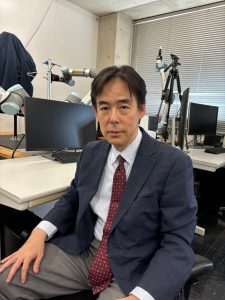

Prof. OGATA, Tetsuya
Dr. Eng.
The Department of Intermedia Art and Science at Waseda University, established in 2007, aims to integrate science, technology, and artistic expression to address new societal needs and foster value creation. It transcends traditional disciplinary boundaries between the sciences and humanities, nurturing individuals capable of contributing to solving societal challenges through innovative forms of expression.
Fusion of Diverse Academic Fields: During the first and second years, students will study foundational knowledge across a wide range of fields including acoustics, music, visual arts, film, human engineering, artificial intelligence, robotics, cognitive science, philosophy, and media arts.
Practical Skill Development through Creative Activities: In the first and second years, students will gain practical experience in planning, production, and presentation, fostering expressive abilities and problem-solving skills.
Specialized Learning in Research Labs: Starting from the third year, students will join research labs to pursue specialized studies and solidify their own academic backgrounds.
Collaboration with Various Fields: Through research activities in collaboration with experts from various fields such as media, entertainment, and design, students will develop a broad perspective and flexible thinking skills.
In engineering, systems evaluation is commonly measured by ‘quantitative metrics’ such as energy efficiency, processing accuracy, communication efficiency, recognition rates, etc. Let’s consider smartphones here. While smartphones can function as cameras, gaming consoles, and telephones, their individual ‘metric’ performances can not be beyond those of dedicated devices. However, despite being insufficient in individual metrics, the clever integration of diverse functionalities through design grew the market value of smartphones several times greater than the sum of all other dedicated devices. The Department of Intermedia Art and Science aims to create new societal values beyond metric-based evaluations by integrating various research fields including engineering, artistic expression, and humanities.
Recently, the rapid advancement of deep learning and subsequent generative AI poses a drastic shift in the conventional norms of science and technology, altering the fabric of society. Consequently, promoting responsible AI (AI Alliance) has been important. In such a landscape, talented persons with solid professionality and “flexibility” for collaborating with insights from artistic expression, humanities, and social sciences. The Department of Intermedia Art and Science provides a platform to engage with diverse perspectives and disciplines. Leveraging this environment, individuals can contribute to society as professionals capable of understanding emerging technologies from a broader perspective in our increasingly diverse society. We expect to see individual students utilizing this environment to contribute to society.
I have been researching the integration of artificial neural networks, which form the foundation of current AI (deep learning), with humanoid robots for over 30 years, starting from my undergraduate research at Waseda University. By leveraging deep learning for robot motion learning, I have achieved handling of diverse objects such as flexible materials, powders, viscous liquids, etc., which were previously challenging in traditional robotics. Some companies have commercialized these technologies so far. Moreover, we have also expanded into communication robots and developed ‘Vtuber-type robots’ that interact with humans in the physical world. However, behind these applied research efforts lies fundamental research aimed at understanding human cognition, learning, and development mechanisms not through human observation but through the development of artificial neural networks and humanoid robots (called the constructivist approach). Despite dedicating 30 years to this research, understanding humans is still a difficult problem. But I believe that the fundamental research will lead to entirely new technologies, like deep learning, that we cannot even imagine today.
School examinations are typical examples of “quantitative” evaluations. As I mentioned above, most of the “values” of humans cannot be expressed in “quantitative” terms. Not everything you study in school could be useful. However, as mentioned earlier, after solidifying your professionality, flexibility to accept diverse knowledge becomes particularly important in the future. Embracing the opportunity of school examinations as a chance to cultivate the “flexibility” to engage with knowledge and values that may seem unrelated to yourself, both now and in the future, could be a valuable perspective. Universities (especially in laboratories) can provide environments where you can create fascinating unknowns, unique contributions only you can make, even if you currently perceive them as irrelevant. I’m looking forward to working with you.